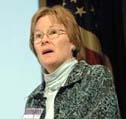 |
   |
|
December 12, 2008
Retreat Refreshes Behavioral, Social Sciences
 Dr. Christine Bachrach
Dr. Christine Bachrach
Dr. Christine Bachrach, acting director of the Office of Behavioral and Social Sciences Research, wanted just one thing out of the first-ever day-long retreat for NIH’s widely dispersed community of behavioral and social scientists, held Nov. 12 at Natcher Bldg.
December 12, 2008
CBT4CBT
New Hope for Treatment of Addiction
 Dr. Kathleen Carroll
Dr. Kathleen Carroll
Drug addiction is notoriously tough to treat, but now research is showing a fresh way to tackle the problem. It’s called computer-based training for cognitive-behavioral therapy (CBT4CBT)
OBSSR’s Mabry Wins with Systems Analysis Team
 OBSSR’s Mabry Wins with Systems Analysis Team
OBSSR’s Mabry Wins with Systems Analysis Team
More News >>
|
  |
|
January 28-29, 2009 Dissemination and Implementation Conference
February 9, 2009, 10:00 – 11:00 AM
Stigma: Lessons & New Directions from a Decade of Research on Mental Illness
July 12-24, 2009
OBSSR/NIH Summer Training Institute on Randomized Clinical Trials Involving Behavioral Interventions
May 3-8, 2009
Institute on Systems Science and Health
May 22-25, 2009
Gene-Environment Interplay in Stress and Health at the Association for Psychological Science 21st Annual Convention, San Francisco, CA
More Events >>
|
|
|
 |
 |
 |
 |
|
Home > Training and Career Development > Annual RCT Course
|
Summer Institute on Design and Conduct of Randomized Clinical Trials Involving Behavioral Interventions |
Frequently Asked Questions
Question: Could you please clarify the eligibility criteria?
Answer: Firstly, we are giving preference to individuals who already have their PhD or MD (or equivalent degrees) and have at least two years of
subsequent research experience. Applicants should not yet achieved tenure ranked positions (i.e., have tenure) at their institution. While we will
consider and may even accept “exceptional” applicants who do not met these criteria, priority will go to those who do. Secondly, applicants
must be US citizens or non-citizens with permanent residence status.
Beyond these eligibility criteria, we are seeking people who have some demonstrated research experience and who can benefit from the training. In
addition, we will take into account diversity of research interests, disciplines, geography, race, and gender in making final decisions. The primary
basis is, however, on demonstrated research experience and promise for future research contributions.
Question: Whom should I ask to write my letter of recommendation?
Answer: Your reference does not have to be in the same area of research, but should be someone who is familiar with you and your research interests and
skills. Your reference should be able to speak to research career goals and your promise for making future contributions. You are free to ask whomever
you believe can best speak to your current and potential research achievements.
Question: Are NIH employees eligible?
Answer: Yes. However, the course is primarily for non-NIH researchers. Consequently, priority will be given to extramural scientists over intramural NIH
scientists or Health Scientist Administrators. If accepted, NIH employees would be expected to attend all sessions of the course. NIH employees should
consider attending the NIH Symposium Series instead.
Question: I am a post-doctoral student attending an American university on a student visa (i.e., I am not a US citizen), which permits me to stay in
the USA for the next couple of years. Am I eligible?
Answer: No. Due to space limitations, the course is open only to US citizens or non-citizen nationals of the United States, who must have been lawfully
admitted to the United States for permanent residence (i.e., possess a currently valid Alien Registration Receipt Card I-551, or other legal
verification of such status).
Question: How many people will be accepted for the course?
Answer: 30.
Question: Can more than one person from an organization apply? How will you decide among multiple applicants from the same institution?
Answer: Yes. We will evaluate each application on its own merits. Assuming that in the end we have more than 30 meritorious applications, we will then
take into account other criteria such as disciplinary, geographical, and institutional diversity. We will also follow NIHs guidelines in promoting
training for underrepresented minorities, women, and handicapped individuals.
Question: If I am accepted, can I bring my spouse and/or children?
Answer: Yes, but at your own expense. Please read the information posted at Airlie
for these costs and other circumstances that may influence
your decision about bringing guests.
Question: Will this course be offered again?
Answer: We intend to offer this course again, probably in 2004 to 2007.
Question: Can you send me the course materials (e.g., bibliography) if I am unable to attend?
Answer: We plan to make available on the HomePage as much of the course materials as soon as possible. We will announce via the listserv whenever they
are posted. Material from the
2001 is now available. 2002 Course materials will be posted in the next several weeks..
|
|
|
 |
 |
 |
 |
|
|
 |